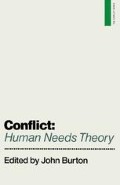Abstract
It is becoming increasingly evident that if needs theory is to prevail as a viable part of social theory it must have an ontological grounding which hopefully will provide a basis for agreement among scholars and help silence the critics.
Access this chapter
Tax calculation will be finalised at checkout
Purchases are for personal use only
Preview
Unable to display preview. Download preview PDF.
Notes and References
Theodore D. Kemper, “How Many Emotions Are There? Wedding the Social and the Autonomic Components,” American Journal of Sociology, 93 (1987): 263–89.
David Funkenstein, “The Physiology of Fear and Anger,” Scientific American, 192 (1955): 78–80.
Stanley Schachter and Jerome Singer, “Cognitive, Social and Physiological Determinants of Emotional State,” Psychological Review, 69 (1962): 379–99.
Theodore D. Kemper, A Social Interactional Theory of Emotions (New York: Wiley, 1978).
Rom Harre (ed.), The Social Construction of Emotion (New York: Blackwell, 1986);
Theodore D. Kemper, “Social Constructionist and Positivist Approaches to the Sociology of Emotions,” American Journal of Sociology, 87 (1981): 336–62.
Paul Ekman, “Expression and the Nature of Emotions,” in Klaus R. Scherer and Paul Ekman (eds), Approaches to Emotions (Hillsdale, N.J.: Lawrence Erlbaum, 1984).
Paul Ekman, W. V. Friesen and S. Ancoli, “Facial Expressions of Emotional Experiences,” Journal of Personal and Social Psychology, 39 (1980): 1125–34.
Charles Darwin, The Expression of Emotion in Man and Animals (New York: Philosophical Library, 1955).
George Casper Homans, Social Behavior: Its Elementary Forms (New York: Harcourt Brace Jovanovich, 1974).
Eleanora Masini, “Needs and Dynamics,” in Katrin Lederer (ed.) with Johan Galtung and David Antal, Human Needs: A Contribution to the Current Debate (Cambridge, MA: Oelgeschlager, Gunn & Hain, 1980): 227.
Karl R. Popper and John C. Eccles, The Self and Its Brain (New York: Springer, 1977).
George H. Mead, Mind, Self and Society (Chicago: University of Chicago Press, 1934).
Michael S. Gazzaniga, Mind Matters (New York; Houghton Mifflin, 1988).
Paul Sites, Control: The Basis of Social Order (New York: Dunellen, 1973).
Martin Seligmann, Helplessness (San Francisco: W. H. Freeman, 1975).
Ellen J. Langer, The Psychology of Control (Beverley Hills, CA: Gunn & Hain, 1983).
Mircea Eliade, A History of Religious Ideas, vol. 1 (Chicago: The University of Chicago Press, 1978).
Peter Berger and Thomas Luckman, The Social Construction of Reality (Garden City, N.Y.: Doubleday, 1967).
Such as Harold Garfinkel, Studies in Ethnomethodology (Garden City, N.J.: Prentice-Hall, 1967).
Clyde Kluckhohn, “Values and Value Orientations in the Theory of Action,” in T. Parsons and E. A. Shils (eds), Towards a General Theory of Action (Cambridge, MA: 40 Harvard University Press, 1951).
Howard, P. Becker, Through Values to Social Interpretation (Durham, NC: Duke University Press, 1950).
Max Weber, Economy and Society, Guenther Roth and Claus Wittich (eds) (Berkeley: University of California Press, 1968).
Richard Emerson, “Toward a Theory of Value in Social Exchange,” in Karen J. Cook (ed.), Social Exchange Theory (Beverley Hills, CA: Sage, 1987).
Jonathan H. Turner A Theory of Social Interaction (Stanford, CA: Stanford University Press, 1988).
Thomas Scheff, “Shame and Conformity: The Deference Emotion System,” American Sociological Review, 53 (1988): 395–406.
Thomas Scheff, “The Shame/Rage Spiral Case Study of an Interminable Quarrel,” in H. B. Lewis (ed.), The Role of Shame in Sympton Formation, (Hillsdale, N.J.: Lawrence Erlbaum, 1987).
Richard Sennett and Jonathan Cobb, The Hidden Injuries of Class (New York: Vintage, 1972).
Georg Simmel, “Mental Health in the Metropolis,” in Kurt Wolff (ed.), The Sociology of Georg Simmel (Glencoe, IL: The Free Press, 1950).
R. Ader, “Psychosomatic and Psychoimmunological Research,” Psychosomatic Medicine, 42 (1980): 307–21.
H. Selye, The Stress of Life (New York: Van Nostrand Reinhold, 1979).
Richard Lazarus and Susan Folkman, Stress, Appraisal and Coping (New York: Springer, 1984).
Michael S. Gazzaniga, Social Brain (New York: Basic Books, 1985);
I. Thomas, The Unadjusted Girl (Boston: Little, Brown & Co., 1923).
A. H. Maslow, Motivation and Personality (New York: Harper & Row, 1954).
E. H. Erikson, Childhood and Society (New York: Norton, 1963).
Erving Goffman, The Presentation of Self in Everyday Life (Garden City, N.Y.: Doubleday, 1959);
Randall Collins, “The Microfoundations of Macrosociology,” American Journal of Sociology, 86 (1981): 984–1014;
Randall Collins, Theoretical Sociology (New York: Harcourt Brace Jovanovich, 1988).
Karl Marx, Economic and Philosophical Manuscripts of 1844, M. Milligam (trans.) (New York: International Publishers, 1964).
C. B. Macpherson, The Real World of Democracy (Toronto: Canadian Broadcasting Co., 1965).
C. Wright Mills, White Collar (New York: Oxford University Press, 1953).
Karl Marx and Frederick Engels, The Holy Family (Moscow: Progress Publishers, 1975).
Richard Emerson, “Power-Dependence Relationships,” American Sociological Review, 27 (1962): 31–4.
Christian Bay, The Structure of Freedom (Stanford, CA: Stanford University Press, 1958).
Randall Collins, Conflict Sociology (New York: Academic Press, 1975).
Gerhard E. Lenski, Power and Privilege: A Theory of Social Stratification (New York: McGraw-Hill, 1966).
John W. Burton, Deviance, Terrorism, and War: The Process of Solving Unsolved Social and Political Problems (New York: St Martin’s Press, 1979).
Christian Bay, “Needs, Wants and Political Legitimacy,” Canadian Journal of Political Science, 1 (1968): 241–60.
Kate Soper, On Human Needs (Atlantic Heights, N.J.: Humanities Press, 1981): 2 and 4.
E. E. Schattschneider, The Semi-Sovereign People (New York: Holt, Rinehart & Winston, 1960).
Editor information
Editors and Affiliations
Copyright information
© 1990 John Burton
About this chapter
Cite this chapter
Sites, P. (1990). Needs as Analogues of Emotions. In: Burton, J. (eds) Conflict: Human Needs Theory. The Conflict Series. Palgrave Macmillan, London. https://doi.org/10.1007/978-1-349-21000-8_2
Download citation
DOI: https://doi.org/10.1007/978-1-349-21000-8_2
Publisher Name: Palgrave Macmillan, London
Print ISBN: 978-1-349-21002-2
Online ISBN: 978-1-349-21000-8
eBook Packages: Biomedical and Life SciencesBiomedical and Life Sciences (R0)

